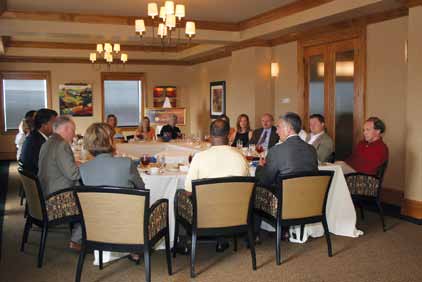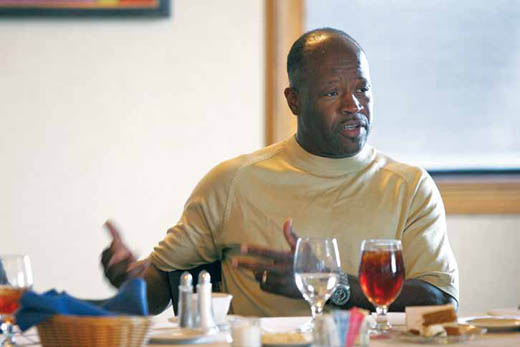Alden promotes sporting partnerships with community

Whose bright idea was it, Alden asked, to choose blue and white as the colors for the city buses tooling around town?
“You guys laugh,” Alden said after hearing chuckles around the room, “and those guys kind of did the same thing. But they’re basically the colors of our arch rival, KU.”
Alden said he’s not advocating that the city spend the money to repaint all of the buses black and gold, but he’s using it as an example of a marketing opportunity that was missed.
MU and community leaders, he said, should always be looking for ways to promote the teams because what’s good for the Tigers is good for the Tiger town.
“We are not the most important thing that happens at the university by any stretch of the imagination,” Alden said of the athletic program. “But, frankly, we are probably the strongest advertising vehicle that this university has, bar none.”
The strength of the athletic department, as well the popularity of the teams at MU, has grown significantly since Alden’s arrival.
Alden has overseen $163 million worth of improvements to the athletic facilities, and the annual operational budget has climbed from less than $14 million to $65 million. The amount of money coming to his department from MU’s operating fund has dropped from $2.2 million to $1.7 million, and Alden predicted that amount will be zero in two years.
“MU was one of only 14 programs in the country that actually broke even or turned a profit,” he said. “That’s tall cotton we’re with — Alabama, Ohio State, Florida, Texas…”

“That’s a significant number of people who touch what we’re trying to do in athletics at the institution but really in Columbia and mid-Missouri,” Alden said. “It always gives us an opportunity to sell the university, to sell Columbia.”
In turn, Julie Ausmus, the sports development fund director at the Columbia Convention and Visitors Bureau, pointed out that events hosted by the city help expose visitors to MU and help with recruitment.
Alden said that during homecoming weekend of football season, there are 30,000 people downtown for the parade, many of whom also shop and go into the cafés and restaurants.
More than six million people might watch a nationally televised football game, Alden said. “It’s a huge advertising impact for our community.”
But forum participants pointed out that no one is calculating even a rough estimate of that economic impact.
The Visitors Bureau tried to come up with an estimate of the economic impact of last year’s home football game against Nebraska and guessed $2 million.
But Kristi Ray, vice president of the Chamber of Commerce, said she believes that’s low, considering that Nebraska uses an impact figure of $6 million for one of its home games.
Alden said the last time MU studied the financial impact of its athletic program was 14 years ago.

Although they’re not directly related, MU has had record enrollment for several straight years, and the athletic program has been more successful than ever in terms of wins, postseason competition and other measurements.

“You thought we had some highlights last year,” Anderson said. “You’re going to see a lot more from this team this year. … My challenge to you guys and everybody in Columbia and the state of Missouri: I want the Mizzou Arena filled up.”

“We have to win games and grow our attendance,” Pingeton said. “Everybody wants to support a winning program, but we need your patience. It doesn’t happen overnight. In the mean time … we need you guys to jump on board.”
Anderson and other forum participants said they’d like to see a lower number of “no-shows,” people who bought season tickets but leave the seats empty, particularly in the early games of a team schedule before conference play begins.

In the current system, if a season ticket holder decides to stay home in St. Louis, someone would have to get that physical ticket to get into the game. With the bar-code system, he said, the fan could let MU know he or she is not attending, and the university can cancel the ticket electronically and issue a new one assigned to the seat.
The Power Lunch Agenda:
What can MU administrators, city officials and business operators do to make a visitor’s experience in Columbia as positive as possible? Could working together benefit commercial activity, attendance and recruiting?
Director of Athletics Mike Alden; his senior associate, Tim Hickman; and his two head basketball coaches, Mike Anderson and Robin Pingeton; addressed those questions in a dialogue with business community leaders.
Power Lunch Participants
Presenter:
Mike Alden; MU Director of Athletics
Participants:
Mike Anderson; MU Head Basketball Coach
Julie Ausmus; Sports Development Fund Director,
Columbia Convention & Visitor’s Bureau
Carrie Gartner; Director, Special Business District
Tim Hickman; MU Senior Associate Athletic Director
Don Laird; President, Chamber of Commerce
Emily Lorenz; Coordinator, Show-Me State Games
Laura Nauser; 5th Ward Representative, City Council
Robin Pingeton; MU Head Women’s Basketball Coach
Kristi Ray; Vice President, Chamber of Commerce
Jeff Schoultz; Director, Mizzou Sports Properties
Tony St. Romaine; Assistant City Manager
The Callaway Bank:
Gary Meyerpeter; President, Boone Co. Market
Chuck Everitt; Member, Advisory Board
Debbie Larue; Vice President, Marketing
Craig Brumfield; Business Development officer


